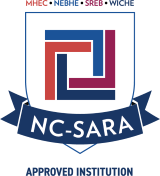State Authorization Requirements & Complaint Resolution
STATE AUTHORIZATION
On October 29, 2010, the U.S. Department of Education (USDOE) released "program integrity" regulations that focused on the need for institutions offering distance education programs to acquire authorization from any state in which they operate. As an institution that has students residing across the United States, Goucher College is required to obtain such authorization to operate based on the activities it conducts in those states. These regulations have been updated with an effective date of July 1, 2020.
In all states, except California, as well as Washington, D.C., Puerto Rico, and the U.S. Virgin Islands, Goucher is authorized to operate through what is known as the State Authorization Reciprocity Agreement or “SARA.” SARA is an agreement among member states, districts, and territories that establishes comparable national standards for interstate offering of postsecondary distance education courses and programs. It is intended to make it easier for students to take online courses offered by postsecondary institutions based in another state and to ease the regulatory burden on institutions, thereby increasing affordability.
The State of Maryland is a member of SARA, and Goucher participates in SARA, thereby
gaining permission to operate in SARA states. In the state of California, Goucher is exempt from requirements to obtain state
authorization.
Out-of-state learning placement (practicums, internships...)
Supervised out-of-state learning placements do not establish a physical presence under NC-SARA and are, therefore, covered by the provisions of the SARA governing interstate distance
education activity, regardless of whether the out-of-state learning placement is part of a distance-education
or campus-based program. Examples of such experiences may include, but are not limited to: practicum, student
teaching, field experience, or internships. All Goucher degree and certificate programs
allow the completion of these experiences in any state. Please refer to the curriculum
information of the specific degree/certificate program for details.
Complaint resolution
Goucher College makes every effort to resolve student complaints internally, using policies and procedures outlined by the College.
If the complaint cannot be resolved informally, you are encouraged to use Goucher’s Student Grievance Procedure (PDF). For information or questions about this procedure, contact the General Counsel. Other policies and procedures may apply, depending on the nature of your complaint.
If your complaint is not resolved, you may file a complaint with the Maryland Commission on Higher Education, Maryland’s SARA “portal agency.” Information about how to file such a complaint can be found on MHEC’s website.
For complaint resolution contacts by state, you can find a list of state higher education agencies and NC-SARA state portal entity contacts on the SARA website. A list of state consumer protection agencies can be found on the state consumer protection office's website.
If you need additional assistance in locating state complaint procedures, please contact
the legal counsel’s office.
Goucher College accreditation
Goucher College is regionally accredited by the Middle States Commission on Higher Education. The Commission has authorized Goucher to offer baccalaureate and master’s degrees, and post-baccalaureate and professional graduate certificates. For information about filing a complaint with the Middle States Commission on Higher Education, visit the MSCHE information page.
Middle States Commission on Higher Education
3624 Market Street, 2nd Floor West
Philadelphia, PA 19104
Phone: (267) 284-5000
 National Council for State Authorization Reciprocity Agreements (NC-SARA)
National Council for State Authorization Reciprocity Agreements (NC-SARA)
Goucher College has been approved to participate in the National Council for State
Authorization Reciprocity Agreements.
SREB ELECTRONIC CAMPUS
Goucher College is a participating institution of the Southern Regional Education Board's (SREB) Electronic Campus.
Goucher has reviewed its eight online Master's Degree programs against SREB's Principles of Good Practice, and the programs have been approved for inclusion in the Electronic Campus through Maryland's Higher Education Commission.
